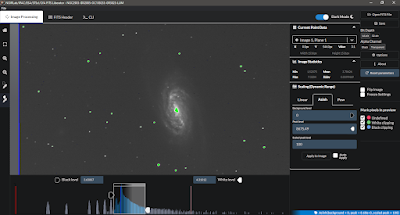It is available from NOIRLab (part of the National Science Foundation). First learned of the newest version of 9 Feb, a couple of days ago. It was released in early 2021.
On examining the screen snapshot on their web site, I was thrilled to see a dark mode button. Thank the Universe! Falling inline with all the other image editors.
I reviewed the feature list. Ah, 64-bit support. Makes sense. Whoa, hold the horses. I noted the minimum requirement is 64 bitness. Dang. My main computer is stuck in 32-bit so I won't be able to take advantage directly.
Ooh. Full screen. That's some important. The previous version 3 ran in a small window and the image space was a fraction of that! So you were really hemmed in.
When I ran the app, I discovered the "toggle full page" button which ditches the chrome in the app. Sweet. Now you can do a full proper preview of an image. Combined with dark mode, you have a much better sense of brightness, gradients, and overall image quality.
Overall, the interface is the same but things have been gently reworked. For example, FL3 had a combo-box drop-down menu for the stretch method. Now we have three tabs. The Power tab however supports a factor so you can achieve any direct or fractional power required. This makes for a cleaner interface. And when you run maximised, everything is less crowded.
One thing I discovered that I could not do is zoom into the histogram. I used to do that to drop the black point with some precision. I sent an email to the general mailbox...
Another fun discovery was learning that you can drag-and-drop a file into the editor space. That's so useful. That's a huge productivity boost. It was a pain having to close down and restart the app each time before.
There are two videos available by Robert Hurt, one of the project originators, to help one get up to speed. I jumped into the second and learned a lot. Quite good.
I downloaded the quick start guide but found it pretty light-weight. I had a quick look "A short introduction to astronomical image processing" PDF as well. It's fair.
So? I like it. A lot.



No comments:
Post a Comment